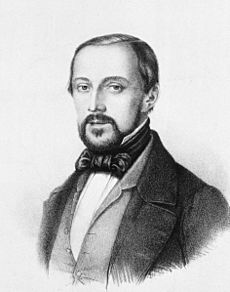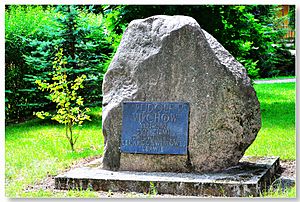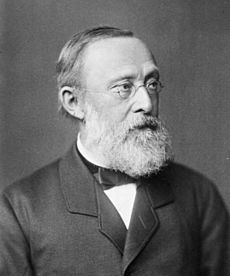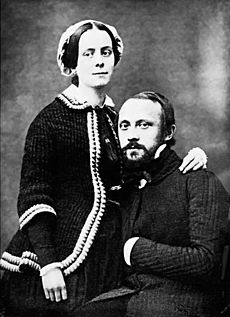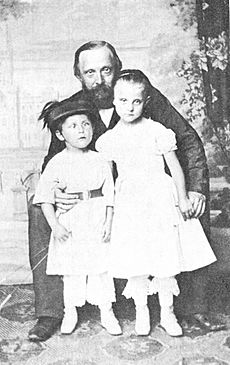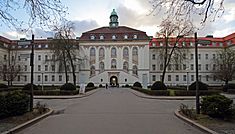Rudolf Virchow facts for kids
Quick facts for kids
Rudolf Virchow
|
|
|---|---|
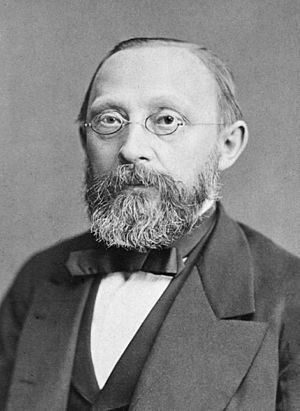 |
|
| Born | 13 October 1821 Schivelbein, Pomerania, Kingdom of Prussia, German Confederation
|
| Died | 5 September 1902 (aged 80) |
| Resting place | Alter St.-Matthäus-Kirchhof, Schöneberg |
| Citizenship | Kingdom of Prussia |
| Education | Friedrich Wilhelm University (M.D., 1843) |
| Known for | Cell theory Cellular pathology Biogenesis Virchow's triad |
| Spouse(s) | Ferdinande Rosalie Mayer (a.k.a. Rose Virchow) |
| Awards | Copley Medal (1892) |
| Scientific career | |
| Fields | Medicine Anthropology |
| Institutions | Charité University of Würzburg |
| Thesis | De rheumate praesertim corneae (1843) |
| Doctoral advisor | Johannes Peter Müller |
| Other academic advisors | Robert Froriep |
| Doctoral students | Friedrich Daniel von Recklinghausen Walther Kruse |
| Other notable students | Ernst Haeckel Edwin Klebs Franz Boas Adolph Kussmaul Max Westenhöfer William Osler William H. Welch |
| Influenced | Eduard Hitzig Charles Scott Sherrington Paul Farmer |
| Signature | |
Rudolf Ludwig Carl Virchow (1821–1902) was a German doctor, scientist, writer, and politician. He is most famous for his cell theory. This theory states that all new cells come from existing cells. He used the Latin phrase Omnis cellula e cellula, which means "all cells (come) from cells."
Virchow is also seen as the founder of social medicine. He believed that things like poverty could cause diseases. He encouraged medical students to use microscopes. He often told them to "think microscopically" to understand how diseases work.
Contents
Rudolf Virchow's Early Life
Rudolf Virchow was born in Schievelbein, a town in what was then Prussia. This area is now called Świdwin in Poland. He was the only child of Carl Christian Siegfried Virchow and Johanna Maria Hesse. His father was a farmer and also the city treasurer.
Rudolf was a very smart student. In 1835, he went to a special high school called a gymnasium in Köslin. He wanted to become a pastor. But he decided to study medicine instead. He felt his voice was too weak for preaching. He finished high school in 1839.
Rudolf Virchow's Scientific Work
In 1840, Virchow received a scholarship. This allowed him to study medicine at Friedrich Wilhelm University in Berlin. Today, this university is called Humboldt University of Berlin. He published his first scientific paper in 1845. The next year, he became a licensed doctor. He also got his first teaching job at the university.
The government hired Virchow in 1847. They wanted him to study a serious disease outbreak. This was a typhus epidemic in Upper Silesia. He wrote a 190-page report about it. He said that the disease could not be stopped just by treating sick people. He believed that the whole community needed better education, freedom, and living conditions. This report changed how people thought about public health in Germany.
Virchow returned to Berlin in March 1848. Soon after, a revolution started against the government. He took an active part in it. He helped start a newspaper called Die Medizinische Reform (Medical Reform). This newspaper promoted social medicine. It said that "medicine is a social science" and "the physician is the natural attorney of the poor." Because of political pressure, he had to stop the newspaper in 1849. He also lost his official job.
In November 1848, he got a new teaching job. He left Berlin for the University of Würzburg. For six years, he focused on his scientific research there. In 1856, he came back to Berlin. He became a professor of Pathological Anatomy and Physiology. He also became the Director of the new Institute for Pathology. He held this important job for 20 years.
Virchow's Work in Anthropology
Virchow became interested in anthropology in 1865. Anthropology is the study of human societies and cultures. He found ancient pile dwellings in northern Germany. In 1869, he helped create the German Anthropological Association. The next year, he founded the Berlin Society for Anthropology, Ethnology, and Prehistory. He was president of this society many times. He also wrote for its main journal.
He led big digs of old hill forts in Pomerania in 1870. He also excavated ancient mounds in Wöllstein in 1875. He traveled to places like Asia Minor, Egypt, and Troy. His trips helped him write books about ancient sites. A special lecture is held every year in his honor for his work in German archaeology.
Rudolf Virchow's Discoveries
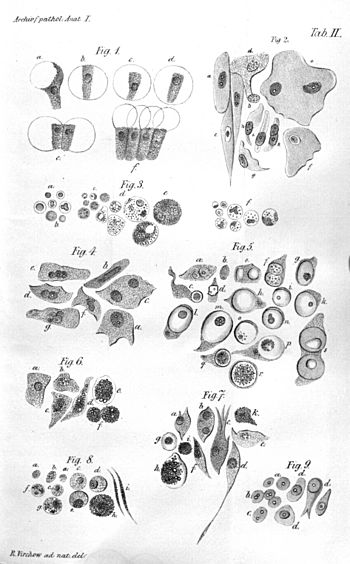
Rudolf Virchow made many important discoveries.
- Cancer Research: He was the first to correctly suggest that cancers come from normal cells. In 1855, he thought cancers might start from "sleeping" cells in tissues. He believed that irritation in tissues caused cancer. This idea was called the "chronic irritation theory." He noticed that some cancers were linked to white blood cells that caused inflammation. Scientists later realized that many cancers are indeed linked to long-term inflammation.
- Cellular Pathology: Virchow is known as the founder of cellular pathology. This field studies how diseases affect cells.
- Infectious Diseases: He was the first to connect infectious diseases between humans and animals.
- Meat Inspection: His work on a tiny worm called Trichinella spiralis led to rules for meat inspection. He showed that humans get this worm from eating infected pork. He also proved that heating the meat to a certain temperature could kill the worms.
- Autopsy Method: Virchow developed a clear way to perform autopsies. An autopsy is an examination of a body after death. His methods are still used today. He was the first to describe how to examine organs one by one. He also showed how to keep important tissues for more study.
- Forensic Science: In 1861, he was the first to analyze hair in a criminal investigation. This was an early step in forensic science.
Rudolf Virchow's Political Life
Virchow was a strong supporter of social and political changes. In 1859, he joined the Municipal Council of Berlin. This started his work as a city reformer. He was elected to the Prussian Diet (a type of parliament) in 1862. He became a leader of the Radical or Progressive party. From 1880 to 1893, he was a member of the Reichstag, which was the German parliament.
He worked hard to make healthcare better for people in Berlin. He especially pushed for modern water and sewer systems.
Rudolf Virchow's Family Life
On August 24, 1850, Rudolf Virchow married Ferdinande Rosalie Mayer in Berlin. They had three sons and three daughters:
- Karl Virchow (1851–1912), who became a chemist.
- Hans Virchow (1852–1940), who became an anatomist.
- Adele Virchow (1855–1955), who married a professor of German studies.
- Ernst Virchow (1858–1942).
- Marie Virchow (1866–1951), who edited her father's letters. She married an Austrian anatomist.
- Hanna Elisabeth Maria Virchow (1873–1963).
Rudolf Virchow's Death
On January 4, 1902, Virchow broke his thigh bone. This happened when he jumped off a moving streetcar. He hoped to recover fully, but his leg never healed. His health slowly got worse. He died of heart failure eight months later, on September 5, 1902, in Berlin.
A public funeral was held for him. He was buried in the Alter St.-Matthäus-Kirchhof in Berlin. His wife was buried in the same tomb in 1913.
Collections and Foundations
Rudolf Virchow was also a collector. Several museums in Berlin grew from his collections. These include the Märkisches Museum and the Ethnological Museum. His collection of anatomical specimens from different groups of people is still important today. The Berlin Society for Anthropology and Prehistory owns this collection.
Honours and Legacy
Rudolf Virchow received many honors and left a lasting impact.
- In 1859, he was elected to the Berlin Chamber of Representatives.
- In 1860, he became an official member of the Royal Scientific Board for Medical Affairs.
- He was elected a foreign member of the Royal Swedish Academy of Sciences in 1861.
- In 1862, he became an international member of the American Philosophical Society.
- He was elected to the Prussian House of Representatives in 1862.
- In 1873, he was elected to the Prussian Academy of Sciences. He was offered a noble title but turned it down. However, he was named "privy councillor" in 1894.
- In 1880, he became a member of the Reichstag (German Parliament).
- The Rudolf-Virchow-Foundation was created in 1881 to celebrate his 60th birthday.
- He was appointed Rector (head) of Berlin University in 1892.
- In 1892, he received the Copley Medal from the British Royal Society. This is a very important science award.
- The Rudolf Virchow Center was opened in 2002 at the University of Würzburg. It is a biomedical research center.
- The Rudolf Virchow Award is given for achievements in medical anthropology.
- The Rudolf Virchow lecture is an annual public lecture for scientists in archaeology.
- The Rudolf Virchow Medical Society in New York offers the Rudolf Virchow Medal.
- A part of the Charité hospital in Berlin is named Campus Virchow Klinikum (CVK).
- The Rudolf Virchow Monument, a statue, was put up in Berlin in 1910.
- Langenbeck-Virchow-Haus was built in Berlin in 1915. It honors Virchow and another doctor, Bernhard von Langenbeck.
- The Rudolf Virchow Study Center works to collect all of Virchow's writings.
- Virchow Hill in Antarctica is named after him.
Rudolf Virchow's Works
Virchow wrote over 2,000 works. His most famous books include a six-volume Handbuch der speciellen Pathologie und Therapie (Handbook on Special Pathology and Therapeutics) from 1854. His book Cellular Pathology (1858) is seen as the foundation of modern medical science.
Interesting Facts About Rudolf Virchow
- Virchow could speak many languages. These included German, Latin, Greek, Hebrew, English, Arabic, French, Italian, and Dutch.
- He is sometimes called the "Pope of medicine."
- Virchow was the first to describe and name diseases like leukemia and embolism.
- Some medical terms are named after him, such as Virchow's node and Virchow's triad.
- Virchow did not agree with Darwin's theory of evolution. He argued against teaching it in schools. He believed that "it is quite certain that man did not descend from the apes."
Rudolf Virchow Quotes
- "Only those who regard healing as the ultimate goal of their efforts can, therefore, be designated as physicians."
- "Belief has no place as far as science reaches, and may be first permitted to take root where science stops."
- "Medical education does not exist to provide students with a way of making a living, but to ensure the health of the community."
- "The physicians are the natural attorneys of the poor, and the social problems should largely be solved by them."
- "The body is a cell state in which every cell is a citizen. Disease is merely the conflict of the citizens of the state brought about by the action of external forces."
See Also
 In Spanish: Rudolf Virchow para niños
In Spanish: Rudolf Virchow para niños
 | Selma Burke |
 | Pauline Powell Burns |
 | Frederick J. Brown |
 | Robert Blackburn |


